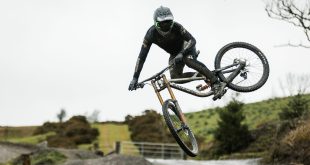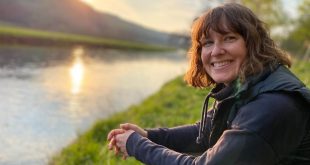Grandtully is a long way from Jerusalem. As the crow flies, the hamlet near Pitlochry in Scotland, is about 2700 miles from Israel. But it’s an even longer journey for the journalist who first revealed Israel’s secret nuclear bomb programme. Peter Hounam is the former Sunday Times chief investigative reporter who, in 1986, broke the story of Mordechai Vanunu, the Israeli nuclear whistle-blower. Today, Hounam lives in Highland Perthshire and is involved with his family’s coffee shop and chocolatier business in Grandtully, between the towns of Aberfeldy and Pitlochry. He also has a publishing house specialising in investigative journalism (his imprint published his assassination conspiracy theory book about the British Royal family, ‘Who Killed Diana?’) and he’s keeping his anti-authority inclinations alive by spending a great deal of time trying to prevent Perth and Kinross Council and Tayside Police from allowing a cycle sportive which closes some roads for three hours once a year.
Perth and Kinross Council loves the Etape Caledonia – the 2011 event was staged last Sunday – because it brings tourists to the region. 5000 riders spend money in the local economy, and 5000 riders likely bring their families with them, too.
A spokesperson for Perth & Kinross Council said: "The event brings huge economic benefit to the area every year and showcases Perthshire as a top cycling and visitor destination."
The Etape Caledonia, created in 2007, usually sells out in seconds, partly because of its glorious location but also because it’s run on closed roads. Event entrants can ride along roads without the fear of being squashed or harassed by motorists.
The Etape Caledonia is a sportive, not a race. It has ‘fastest finishers’, not winners. Just as the London Marathon or the Great North Run have a few pro athletes, out for glory, so the Etape Caledonia attracts club cyclists who want to get round in the fastest possible time. And similar to the London Marathon and the Great North Run, the majority of entrants are doing the Etape Caledonia as a challenge, a nice day out in the countryside, raising money for charity.
Following a tack attack in 2009, the Etape Caledonia wrapped itself in a charity name, hoping to quieten the vociferous but tiny number of locals who objected to three hour road closures once a year for a bunch of cyclists. The event is now the Macmillan Cancer Support Etape Caledonia, but opposition to the event has not ceased.
When the idea for the Etape Caledonia was revealed in 2007, some 500 not-in-my-backyard locals are said to have signed a petition to urge the local council to rescind its permission for the ride to take place. A NIMBY protest group was formed. ACRE is short for Anti-Closed Road Event. ACRE put out press statements saying the event was "highway robbery" because it denies "freedom of movement of citizens".
It would prevent people from getting to church in their cars, and going to the shops in their cars, and driving somewhere else…in their cars. ACRE said locals would be "effectively imprisoned in their homes."
The lead spokesman for ACRE is Peter Hounam.
In 1997, Hounam exposed the dangerous world of international cigarette smuggling for BBC TV and won the What The Papers Say award for ‘Scoop of the Year’ when he leaked the Chancelleor’s budget. In 2004, while in Israel filming a BBC documentary on Vanunu and the Dimona nuclear programme, he was detained by the Shin Bet security service and held overnight. There’s a famous photo of him on Getty Images holding a pair of Israeli prison-issue underpants.
All of this national and international intrigue is a far cry from his current campaign. But he’s not overly keen to talk about it. BikeBiz had sent him a list of seven questions, allowing Hounam to back up ACRE’s claim that the local economy was damaged by the Etape Caledonia, and asking why a three hour road closure was such a huge issue for such an eminent and award-winning former journalist.
In a terse email reply Hounam said:
"You should practice asking open not loaded questions. We shall be issuing our arguments on legality when ready but they do not have permission to race only to run a trial and it is no longer that for many participants. Why not investigate this yourself. No more to add."
He’s more open with his local media.
Previously, he has told local newspapers: "This is an economically fragile area. Businesses that were forced to close on Sunday cannot afford to lose several thousand pounds on a summer Sunday. The figures put about of financial benefit to the area are cooked."
He has distanced ACRE from the sabotage of 2009; sabotage which happened again this year, too, although on a less damaging scale.
He told one aggrieved cyclist:
"ACRE had nothing to do with what happened and utterly deplores it. I am sorry you had your day spoilt. We are not Nimbies nor anti-cyclist. We have offered to help run an open road event. Our beef it with the council for imposing this on the area and causing avoidable inconvenience to many people as well as financial loss to a significant number of people though not my own business."
He has also said: “There are even more locals who are not business people who are truly bewildered that their elected representatives have sequestered their roads causing substantial inconvenience without properly consulting them…We are against our council ignoring local wishes and allowing a commercial company to close our roads…"
Our roads? Local people do not own local roads. Roads are a national resource, open to all, and paid for by all. Roads are paid for by council tax and income tax. Motorists – local or national – do not pay directly for roads.
Participants in this year’s Etape Caledonia said they saw no protests against the ride. One said: "If the local people are so against it then who were all the lovely people stood by the roadside cheering, waving flags and playing the bagpipes?"
Former BBC TV news reporter Simon Willis, who now runs a video production business in Scotland, was one of this year’s riders. It was his first ever sportive and he thoroughly enjoyed it.
He said: "Spinning down towards the head of Loch Rannoch, I was mesmerised by the beauty of the river, tumbling over a series of waterfalls. Which I could hear. Perfectly.
"For three hours on a Sunday morning, two glens in hHighland Perthshire were free of motor traffic. The rumble and roar of internal combustion engines, replaced by the swoosh of chains and the panting of human engines. What a difference a closed road makes.
"In my first sportive, I felt so much safer, knowing a 4×4 wasn’t going to come careering around a bend. This is the one and only time when cyclists (and we all drive cars, too) don’t have to ride defensively, curtailing the riding joy in case of cars."
Hounam, and fellow members of ACRE, seem hell-bent on curtailing such motor-free enjoyment. A three hour road closure once a year has taken on huge significance for Hounam and he’s prepared to spend time and money mounting legal challenges against a rather benign, healthy charity challenge event that most other people can see brings visitors and cash into the local economy.
One of those people is local Scottish MP John Swinney.
The MSP for North Tayside is Cabinet Secretary for Finance and Sustainable Growth in the Scottish Government and set the riders off on Sunday.
He said: "It was a pleasure to start the race and to see the goodwill and enthusiasm of all those who took part and those who watched. The race attracts thousands to the local area and I want to make it clear that they are all very welcome."
He added that Etape Caledonia "boosts the local economy and does so much to promote Highland Perthshire."
 BikeBiz Bicycle and cycling retail news
BikeBiz Bicycle and cycling retail news



